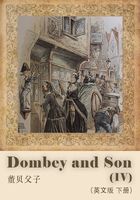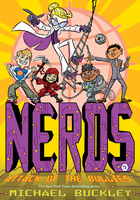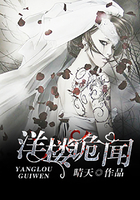It was a little before eight o'clock in the morning when Yakov Petrovitch Golyadkin, a titular councillor, woke up from a long sleep. He yawned, stretched, and at last opened his eyes completely. For two minutes, however, he lay in his bed without moving, as though he were not yet quite certain whether he were awake or still asleep, whether all that was going on around him were real and actual, or the continuation of his confused dreams. Very soon, however, Mr. Golyadkin's senses began more clearly and more distinctly to receive their habitual and everyday impressions. The dirty green, smoke-begrimed, dusty walls of his little room, with the mahogany chest of drawers and chairs, the table painted red, the sofa covered with American leather of a reddish colour with little green flowers on it, and the clothes taken off in haste overnight and flung in a crumpled heap on the sofa, looked at him familiarly. At last the damp autumn day, muggy and dirty, peeped into the room through the dingy window pane with such a hostile, sour grimace that Mr. Golyadkin could not possibly doubt that he was not in the land of Nod, but in the city of Petersburg, in his own flat on the fourth storey of a huge block of buildings in Shestilavotchny Street. When he had made this important discovery Mr. Golyadkin nervously closed his eyes, as though regretting his dream and wanting to go back to it for a moment. But a minute later he leapt out of bed at one bound, probably all at once, grasping the idea about which his scattered and wandering thoughts had been revolving. From his bed he ran straight to a little round looking-glass that stood on his chest of drawers. Though the sleepy, short-sighted countenance and rather bald head reflected in the looking-glass were of such an insignificant type that at first sight they would certainly not have attracted particular attention in any one, yet the owner of the countenance was satisfied with all that he saw in the looking-glass. "What a thing it would be," said Mr. Golyadkin in an undertone, "what a thing it would be if I were not up to the mark today, if something were amiss, if some intrusive pimple had made its appearance, or anything else unpleasant had happened; so far, however, there's nothing wrong, so far everything's all right."
Greatly relieved that everything was all right, Mr Golyadkin put the looking-glass back in its place and, although he had nothing on his feet and was still in the attire in which he was accustomed to go to bed, he ran to the little window and with great interest began looking for something in the courtyard, upon which the windows of his flat looked out. Apparently what he was looking for in the yard quite satisfied him too; his face beamed with a self-satisfied smile. Then, after first peeping, however, behind the partition into his valet Petrushka's little room and making sure that Petrushka was not there, he went on tiptoe to the table, opened the drawer in it and, fumbling in the furthest corner of it, he took from under old yellow papers and all sorts of rubbish a shabby green pocket-book, opened it cautiously, and with care and relish peeped into the furthest and most hidden fold of it. Probably the roll of green, grey, blue, red and particoloured notes looked at Golyadkin, too, with approval: with a radiant face he laid the open pocket-book before him and rubbed his hands vigorously in token of the greatest satisfaction. Finally, he took it out — his comforting roll of notes — and, for the hundredth time since the previous day, counted them over, carefully smoothing out every note between his forefinger and his thumb.
"Seven hundred and fifty roubles in notes," he concluded at last, in a half-whisper. "Seven hundred and fifty roubles, a noteworthy sum! It's an agreeable sum," he went on, in a voice weak and trembling with gratification, as he pinched the roll with his fingers and smiled significantly; "it's a very agreeable sum! A sum agreeable to any one! I should like to see the man to whom that would be a trivial sum! There's no knowing what a man might not do with a sum like that…. What's the meaning of it, though?" thought Mr. Golyadkin; "where's Petrushka?" And still in the same attire he peeped behind the partition again. Again there was no sign of Petrushka; and the samovar standing on the floor was beside itself, fuming and raging in solitude, threatening every minute to boil over, hissing and lisping in its mysterious language, to Mr. Golyadkin something like, "Take me, good people, I'm boiling and perfectly ready."
"Damn the fellow," thought Mr. Golyadkin. "That lazy brute might really drive a man out of all patience; where's he dawdling now?"
In just indignation he went out into the hall, which consisted of a little corridor at the end of which was a door into the entry, and saw his servant surrounded by a good-sized group of lackeys of all sorts, a mixed rabble from outside as well as from the flats of the house. Petrushka was telling something, the others were listening. Apparently the subject of the conversation, or the conversation itself, did not please Mr. Golyadkin. He promptly called Petrushka and returned to his room, displeased and even upset. "That beast would sell a man for a halfpenny, and his master before any one," he thought to himself: "and he has sold me, he certainly has. I bet he has sold me for a farthing. Well?"
"They've brought the livery, sir."
"Put it on, and come here."
When he had put on his livery, Petrushka, with a stupid smile on his face, went in to his master. His costume was incredibly strange. He had on a much-worn green livery, with frayed gold braid on it, apparently made for a man a yard taller than Petrushka. In his hand he had a hat trimmed with the same gold braid and with a feather in it, and at his hip hung a footman's sword in a leather sheath. Finally, to complete the picture, Petrushka, who always liked to be in negligé, was barefooted. Mr. Golyadkin looked at Petrushka from all sides and was apparently satisfied. The livery had evidently been hired for some solemn occasion. It might be observed, too, that during his master's inspection Petrushka watched him with strange expectance and with marked curiosity followed every movement he made, which extremely embarrassed Mr. Golyadkin.
"Well, and how about the carriage?"
"The carriage is here too."
"For the whole day?"
"For the whole day. Twenty five roubles."
"And have the boots been sent?"
"Yes."
"Dolt! can't even say, 'yes, sir.' Bring them here."
Expressing his satisfaction that the boots fitted, Mr. Golyadkin asked for his tea, and for water to wash and shave. He shaved with great care and washed as scrupulously, hurriedly sipped his tea and proceeded to the principal final process of attiring himself: he put on an almost new pair of trousers; then a shirtfront with brass studs, and a very bright and agreeably flowered waistcoat; about his neck he tied a gay, particoloured cravat, and finally drew on his coat, which was also newish and carefully brushed. As he dressed, he more than once looked lovingly at his boots, lifted up first one leg and then the other, admired their shape, kept muttering something to himself, and from time to time made expressive grimaces. Mr. Golyadkin was, however, extremely absent-minded that morning, for he scarcely noticed the little smiles and grimaces made at his expense by Petrushka, who was helping him dress. At last, having arranged everything properly and having finished dressing, Mr. Golyadkin put his pocket-book in his pocket, took a final admiring look at Petrushka, who had put on his boots and was therefore also quite ready, and, noticing that everything was done and that there was nothing left to wait for, he ran hurriedly and fussily out on to the stairs, with a slight throbbing at his heart. The light-blue hired carriage with a crest on it rolled noisily up to the steps. Petrushka, winking to the driver and some of the gaping crowd, helped his master into the carriage; and hardly able to suppress an idiotic laugh, shouted in an unnatural voice: "Off!" jumped up on the footboard, and the whole turnout, clattering and rumbling noisily, rolled into the Nevsky Prospect. As soon as the light-blue carriage dashed out of the gate, Mr. Golyadkin rubbed his hands convulsively and went off into a slow, noiseless chuckle, like a jubilant man who has succeeded in bringing off a splendid performance and is as pleased as Punch with the performance himself. Immediately after his access of gaiety, however, laughter was replaced by a strange and anxious expression on the face of Mr. Golyadkin. Though the weather was damp and muggy, he let down both windows of the carriage and began carefully scrutinizing the passers-by to left and to right, at once assuming a decorous and sedate air when he thought any one was looking at him. At the turning from Liteyny Street into the Nevsky Prospect he was startled by a most unpleasant sensation and, frowning like some poor wretch whose corn has been accidentally trodden on, he huddled with almost panic-stricken hast into the darkest corner of his carriage.
He had seen two of his colleagues, two young clerks serving in the same government department. The young clerks were also, it seemed to Mr. Golyadkin, extremely amazed at meeting their colleague in such a way; one of them, in fact, pointed him out to the other. Mr. Golyadkin even fancied that the other had actually called his name, which, of course, was very unseemly in the street. Our hero concealed himself and did not respond. "The silly youngsters!" he began reflecting to himself. "Why, what is there strange in it? A man in a carriage, a man needs to be in a carriage, and so he hires a carriage. They're simply noodles! I know them — simply silly youngsters, who still need thrashing! They want to be paid a salary for playing pitch-farthing and dawdling about, that's all they're fit for. It'd let them all know, if only…"
Mr. Golyadkin broke off suddenly, petrified. A smart pair of Kazan horses, very familiar to Mr. Golyadkin, in a fashionable droshky, drove rapidly by on the right side of his carriage. The gentleman sitting in the droshky, happening to catch a glimpse of Mr. Golyadkin, who was rather incautiously poking his head out of the carriage window, also appeared to be extremely astonished at the unexpected meeting and, bending out as far as he could, looked with the greatest of curiosity and interest into the corner of the carriage in which our hero made haste to conceal himself. The gentleman in the droshky was Andrey Filippovitch, the head of the office in which Mr. Golyadkin served in the capacity of assistant to the chief clerk. Mr. Golyadkin, seeing that Andrey Filippovitch recognized him, that he was looking at him open-eyed and that it was impossible to hide, blushed up to his ears.
"Bow or not? Call back or not? Recognize him or not?" our hero wondered in indescribable anguish, "or pretend that I am not myself, but somebody else strikingly like me, and look as though nothing were the matter. Simply not I, not I— and that's all," said Mr. Golyadkin, taking off his hat to Andrey Filippovitch and keeping his eyes fixed upon him. "I'm… I'm all right," he whispered with an effort; "I'm… quite all right. It's not I, it's not I— and that is the fact of the matter."
Soon, however, the droshky passed the carriage, and the magnetism of his chief's eyes was at an end. Yet he went on blushing, smiling and muttering something to himself…
"I was a fool not to call back," he thought at last. "I ought to have taken a bolder line and behaved with gentlemanly openness. I ought to have said 'This is how it is, Andrey Filippovitch, I'm asked to the dinner too,' and that's all it is!"
Then, suddenly recalling how taken aback he had been, our hero flushed as hot as fire, frowned, and cast a terrible defiant glance at the front corner of the carriage, a glance calculated to reduce all his foes to ashes. At last, he was suddenly inspired to pull the cord attached to the driver's elbow, and stopped the carriage, telling him to drive back to Liteyny Street. The fact was, it was urgently necessary for Mr. Golyadkin, probably for the sake of his own peace of mind, to say something very interesting to his doctor, Krestyan Ivanovitch. And, though he had made Krestyan Ivanovitch's acquaintance quite recently, having, indeed, only paid him a single visit, and that one the previous week, to consult him about some symptom. but a doctor, as they say, is like a priest, and it would be stupid for him to keep out of sight, and, indeed, it was his duty to know his patients. "Will it be all right, though," our hero went on, getting out of the carriage at the door of a five-storey house in Liteyny Street, at which he had told the driver to stop the carriage: "Will it be all right? Will it be proper? Will it be appropriate? After all, though," he went on, thinking as he mounted the stairs out of breath and trying to suppress that beating of his heart, which had the habit of beating on all other people's staircases: "After all, it's on my own business and there's nothing reprehensible in it…. It would be stupid to keep out of sight. Why, of course, I shall behave as though I were quite all right, and have simply looked in as I passed…. He will see, that it's all just as it should be."
Reasoning like this, Mr. Golyadkin mounted to the second storey and stopped before flat number five, on which there was a handsome brass door-plate with the inscription?—
KRESTYAN IVANOVITCH RUTENSPITZ Doctor of Medicine and Surgery
Stopping at the door, our hero made haste to assume an air of propriety, ease, and even of a certain affability, and prepared to pull the bell. As he was about to do so he promptly and rather appropriately reflected that it might be better to come to-morrow, and that it was not very pressing for the moment. But as he suddenly heard footsteps on the stairs, he immediately changed his mind again and at once rang Krestyan Ivanovitch's bell — with an air, moreover, of great determination.














